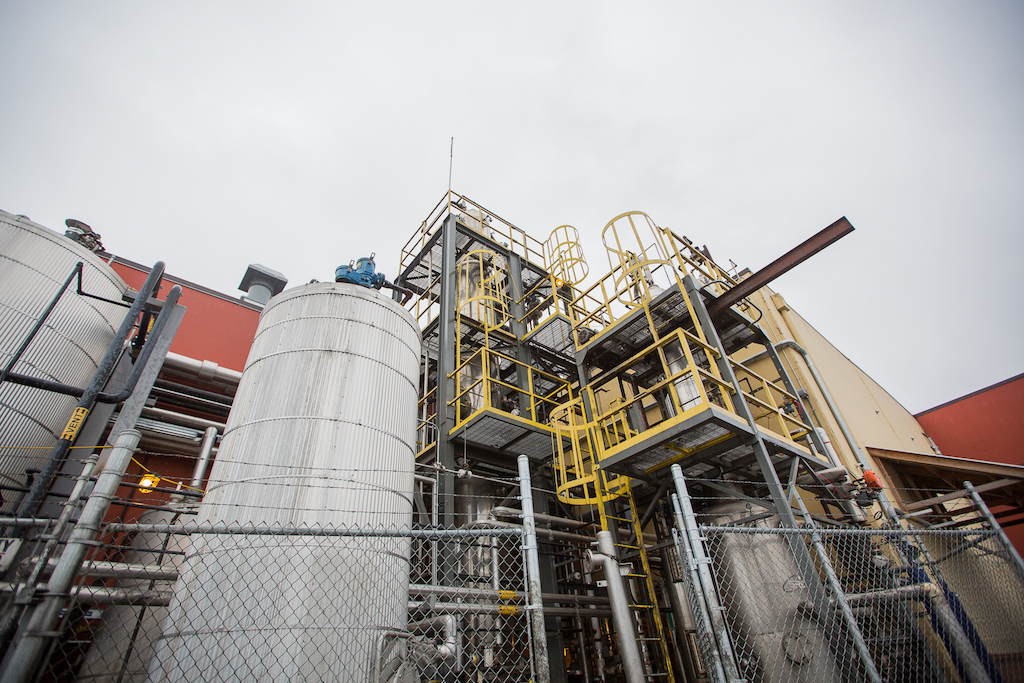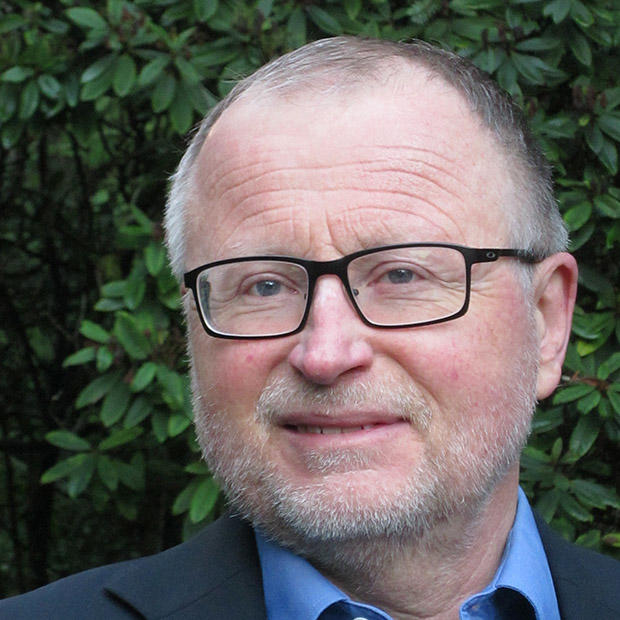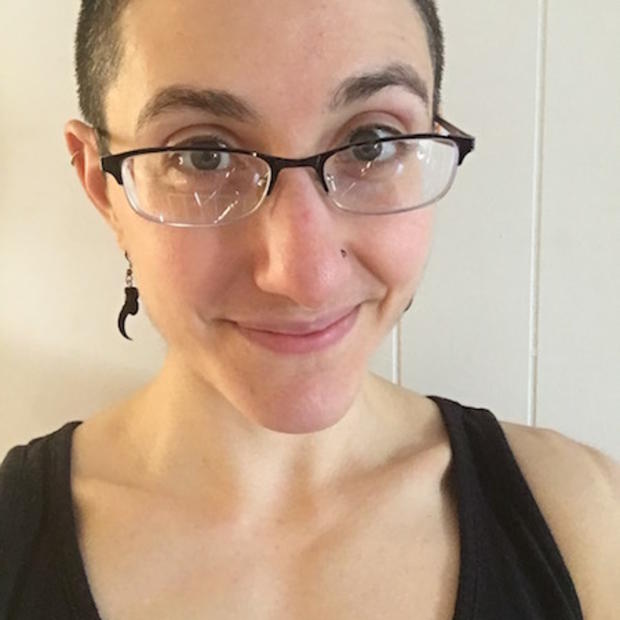“You should eat here. They’ve got good oil,” he says to SeQuential Marketing Manager Rachel Shaver. “That’s how I choose what restaurants to eat at — the quality of the oil. I can tell whether the oil is reused or not. This is good oil. Hasn’t been reused.”
Peters isn’t thinking much about what is going on an hour’s drive south at the Legislature in Olympia — but his bosses are.
Here’s why: The cooking oil he is collecting into his 1,500-gallon vacuum truck will get a second life as biodiesel, an alternative fuel made partially of vegetable oil or animal fats that have a distinctly lower carbon impact than traditional diesel made solely of petroleum. That means biodiesel also doesn’t pollute as much when it’s burned.
But here’s the catch: The biodiesel-to-be that is being sucked into Peters’ truck, like much of what’s collected in Washington, will help reduce climate-wrecking carbon emissions not in the Evergreen State, but across the border in Oregon. There, lawmakers have required progressive reductions in the amount of fossil fuel allowed in gasoline and diesel, hitting a 10 percent drop by 2025.
In other words, in Oregon — as in California and British Columbia — the used cooking oil commands a hefty premium over its price in Washington, where there is no such requirement. You might say the used oil flows toward the money.
This year that may change, though. And it could be a good thing for Washington’s economy.
An hour from Olympia, a maze of industrial pipes feeding storage tanks the size of small apartment houses looms over Grays Harbor on Washington’s central Pacific coast.
This industrial facility was the second-largest biodiesel producer in the nation last year.
The Renewable Energy Group plant employs 40 people in Hoquiam, a town hard-hit by the one-two punch of a withered timber industry and the opiate addiction crisis. Here, those 40 jobs really matter.
REG and Phillips 66 have announced plans to build a similar renewable fuel plant near Bellingham, in Whatcom County, and the companies are still calculating whether to move ahead later this year.
The answer may depend on what the Washington lawmakers do about House Bill 1110, which won committee approval from majority Democrats on the House Environment and Energy Committee during just the second week of the 105-day legislative session. But some Republicans question whether the state should intervene in energy markets, suggesting consumers could pay more.
REG spokesmen say a decision on the Whatcom County plant is due later this year. It would turn out so-called renewable diesel, which it now produces from used food oils, animal-fat wastes and canola at a similar Louisiana plant and sends to West Coast markets like California.
Though REG and Phillips are basing their decision on current markets, the prospect of increased demand in Washington could nudge their decision toward a “yes” if the Washington legislation passes.
"We have put it out to the market that we are going in this direction," says Kent Hartwig, an Iowa-based REG senior manager who testified for the bill in Olympia. "That is really based on the low-carbon markets that are established and the potential for the [clean fuel] standard in Washington.''

If Washington joins Oregon, California and British Columbia with a fuel-blend mandate, Hartwig said "it definitely reinforces our decision."
The low-carbon fuels standard is also being considered in a Senate bill, SB 5412, sponsored by Sen. Rebecca Saldaña, D-Seattle. It got a hearing on Wednesday in Olympia, where Ian Hill, co-founder of SeQuential, told senators Washington is losing out.
“Our industry is moving forward with great progress — leaps and bounds — in Oregon and California and other parts of the country,” Hill said. “Washington is missing out on this opportunity currently.”
Some 17 percent of California’s diesel is biodiesel and that figure is about 7 percent in Oregon, while in Washington it’s just one-half of 1 percent, Hill said in testimony Wednesday.
Environmentalists, other biofuel producers and electric car-maker groups are backing the legislation. Keeping the fuels in Washington state would promote jobs and investments in this state, advocates say.
Some 43 percent of Washington's greenhouse gas emissions come from the transportation sector, with a large share of that from road vehicles targeted by legislation, as Rep. Joe Fitzgibbon, D-Burien, lead sponsor of HB 1110, pointed out at a hearing on his bill earlier in the month.
The legislation would create a somewhat complicated system of tradeable credits for cleaner fuels that can offset the impacts debits associated with the full life-cycle greenhouse-gas pollution associated with dirty fuels.
"It's a tough problem to solve so the solution is going to be a little bit complicated," Fitzgibbon said, adding that the system to be devised by the state Department of Ecology would be "technology neutral." In other words, the system would leave it up to fuel makers which kinds of cleaner fuel credits they buy or create.
Fitzgibbon said that fuel makers and distributors whose product does not meet fuel-blend standards could buy credits from fuel makers whose products do — with credits calculated to reflect the life-cycle carbon content or intensity of the fuels. Those earning credits could include makers of biofuels, meaning biodiesel and renewable diesel producers, as well as producers of renewable natural gas taken from landfills or farm digesters. Similarly, credits could be earned by utilities that generate electricity used for electric or plug-in hybrid cars, if they are able to show this use.
The credits and deficits system should help promote electrification of road car fleets, according to Fitzgibbon.
The oil industry has long opposed state efforts to require or mandate blend standards. But while it fended off action in Washington until this year, it lost political battles in California, Oregon and British Columbia.
Lobbyist Jessica Spiegel of the Sacramento-based Western States Petroleum Association testified against HB 1110 earlier this month, telling a committee in Olympia that consumers would pay more if a fuel standard or mandate is passed.
Spiegel did not make the same doomsday claims her industry made in California and Washington a few years ago that a fuel standard could boost fuel costs by more than a dollar per gallon.
But Spiegel cited a report late last year from industry consultant Stillwater Associates that claimed California's 2011 standard has jacked up the price of gasoline by more than 13 cents per gallon. The California Air Resources Board offered a similar estimate of 13.5 cents for gasoline and about 16 cents more for diesel.
However, neither the Stillwater Report nor the CARB calculations reflect that fuel producers may not be passing on all the extra costs. The Stillwater report suggests that gasoline prices could end up 36 cents a gallon higher in California by the time that state reaches its goal in 2030 of cutting the carbon intensity of road fuels by 20 percent.
The implication is that Washington, which has the second highest state gas tax at more than 49 cents per gallon, could see the same additional increase.
The industry also warns that fuel stocks needed to produce biofuel blends may not yet exist in sufficient quantities to let the state reach its biofuels goals on the gasoline side. Past efforts to convert cellulosic fiber from waste products for ethanol, for example, have not resulted in local production, Spiegel said in an interview.
Backers of biofuels say cost impacts at the fuel pump may be much lower for consumers, citing Oregon state statistics. And they say there are additional environmental and economic benefits if Washington-produced fuels are used closer to home.
Whatever state lawmakers decide, some parties in the oil industry may be getting reconciled to a lower-carbon future for its fuels.
BP — Phillips 66's refining rival in Whatcom County — already opened its own renewable diesel plant adjacent to its Cherry Point refinery last year. The BP plant produces biodiesel from waste or biomass products such as used cooking oil and animal fats, and its process lets the company mix the less-carbon-emitting biomix into regular diesel without a change in performance.
The moves by BP, Phillips and REG suggest that availability of renewable fuel stocks is a less than a deal-killer for the industry. REG’s Hoquiam plant, for example, imports canola oil from the Midwest. And state Department of Commerce spokesmen say fuel stocks are ample. The Union of Concerned Scientists has also put out a report showing Washington’s targets could be achieved.
State legislators are not so concerned either — at least not majority Democrats backing the Fitzgibbon bill. His proposal requires carbon intensity in road fuels be cut by 10 percent by 2028 and by 20 percent by 2035. The measure also would encourage investments in electric car and charging stations as offsets for fuel intensity.
HB 1110 received its first OK in committee last week with support from six of the seven Democrats on the environmental panel and no ayes from the GOP. One member voted against the policy and several others were neutral.
Rep. Richard DeBolt, R-Chehalis, was among the neutral votes, expressing some support for the policy going forward. DeBolt, who is the GOP point person on carbon in the House, also said he didn't think the transportation sector is moving quickly enough toward electrification.
Republicans have largely been seeking incentives rather than mandates to reach climate policy goals.
And clean-fuel critics like Todd Myers of Washington Policy Center think tank argue that a fuels mandate is not the most efficient or cost-effective way to cut carbon emissions from the road sector.
But a long list of interest groups has weighed in with support for the rule, including electric car sellers, environmentalists and biofuels makers like REG and Portland-based SeQuential, which produces some 30 million gallons of biodiesel a year after its merger last year with a Bakersfield, Calif., firm.
Like REG, SeQuential is a big player in collecting restaurant oil wastes, serving an estimated 30 percent of restaurants in Washington.
Hill, the SeQuential co-founder, said in a phone interview that the company collects used cooking oil from up and down the West Coast, and ships most of its product to consumers in Oregon, as well as to California and British Columbia. Both California and British Columbia have policies similar to Oregon’s, which makes the respective markets lucrative. But Washington state doesn’t have this policy, which is why SeQuential only ships a fraction of its biodiesel to consumers in the state, Hill said. It’s simply not that profitable.
"We will continue to operate in Washington state as a feedstock company, and we’ll continue to work hard to grow in Washington state, and be a part of the economy there, but as far as being able to supply low-carbon biodiesel fuel options in a state without a carbon value, it just won’t be feasible," said Hill. "And that’s true for the entire industry."
The same factors are why south Seattle-based General Biodiesel doesn’t sell to any consumers in the state, the company’s CEO and Chairman Jeff Haas said.
Because of the policies in place in Oregon and California — General Biodiesel’s market — it’s still better financially for the company to pay for the shipping costs required to transport the fuel to those states than it is to try to sell to companies in Washington state. Without a similar policy here, there is almost no demand from within the state, he said.
“If Washington creates a competitive environment for biofuels, I would love to sell every drop we produce in Washington,” Haas said in a telephone interview.
The fuel-blend mandate is one of several major climate proposals backed by Democratic Gov. Jay Inslee, who has indicated that climate change policies would be a top campaign priority if he decides to seek his party's presidential nomination.
The House legislation is still a long way from becoming law. It heads now to the House Transportation Committee, after which it would have to go through the Rules Committee, be passed by the full House, and then approved by the Senate in a similar succession of hearings and votes. In the Senate, the legislation still awaits an initial committee approval.
Robert McClure contributed to this report.
InvestigateWest is a Seattle-based nonprofit newsroom producing journalism for the common good.




